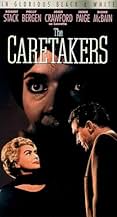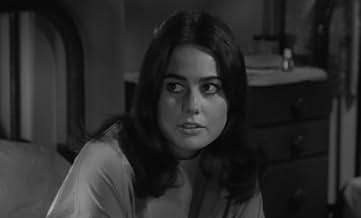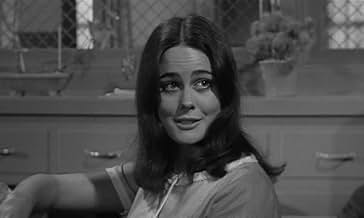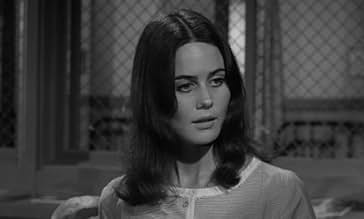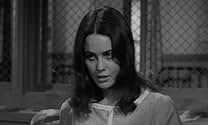Medical drama about mentally-ill patients and their professional caregivers, as well as the new group-therapy sessions aiming to replace the traditional physical restraint and electroshock t... Read allMedical drama about mentally-ill patients and their professional caregivers, as well as the new group-therapy sessions aiming to replace the traditional physical restraint and electroshock treatments.Medical drama about mentally-ill patients and their professional caregivers, as well as the new group-therapy sessions aiming to replace the traditional physical restraint and electroshock treatments.
- Nominated for 1 Oscar
- 5 nominations total
Ana María Lynch
- Ana
- (as Ana St. Clair)
Pamela Austin
- Student Nurse
- (uncredited)
Brian Corcoran
- Tony
- (uncredited)
George DeNormand
- Doctor
- (uncredited)
Featured reviews
One of the most common interest points for me in seeing any film is good concepts or when it takes on a subject not easy to tackle but always worth addressing. Something that was also covered in 'The Snake Pit' and 'One Flew Over the Cuckoo's Nest'. That was the case with 'The Caretakers'. Plus it had Joan Crawford (though the film was from her twilight years period) and Herbert Marshall in it, Crawford especially was more often than not worth watching despite her film choices being up and down.
'The Caretakers' is not one of her best films, nor does it contain one of her best performances. It is also not one of her worst on either count either. It struck me as a rather disappointing but still semi-watchable film that primarily suffers from how it deals with its subject. It may have had good intentions but it didn't translate in the execution, on this front 'The Caretakers' struck me as somewhat lacking in good taste which was somewhat frustrating.
It is benefitted by some very stylish and atmosphere-laden photography and the setting is suitaably austere. Elmer Bernstein's score has haunting moments.
Did not think much of the acting really, but some of the cast come off well. Polly Bergen may have had some terrible and rather limited dialogue, but she had a quite challenging role and manages to give the character force and nuance. Janis Page also does wonders with a role that sounds one-dimensional but makes it remarkably real.
Elsewhere, we have a stiff Robert Stack looking as if he wanted to be somewhere else, even for a sympathetic character he manages to make the character dull, and Crawford in a part that she should have been perfect for chewing the scenery to smithereens. Marshall also looks ill at ease in a part that has so little to it. None of the characters are written very well at all, too "black and white" so either characters too perfect or ones with not a redeeming bone in their bodies and never really in between (Page's being a possible exception). The direction is bland at best and schlocky at worst.
Although Bernstein's score has moments, too much is ridiculously overblown and over-emphasises the mood too much. The script goes well overboard on the camp, containing some real howlers, and is very awkward such as with poor Bergen in the early stages. The story is a real mess, what could have been a hard hitting and poignant film was instead rather gratuitously distasteful, offered very little insight into the subject, showed no respect for it or its characters and because of its numerous bouts of unintentional humour it was very difficult to take it seriously, something that the writing was not good in general at doing. Almost to an insulting degree.
Concluding, disappointing. 4/10
'The Caretakers' is not one of her best films, nor does it contain one of her best performances. It is also not one of her worst on either count either. It struck me as a rather disappointing but still semi-watchable film that primarily suffers from how it deals with its subject. It may have had good intentions but it didn't translate in the execution, on this front 'The Caretakers' struck me as somewhat lacking in good taste which was somewhat frustrating.
It is benefitted by some very stylish and atmosphere-laden photography and the setting is suitaably austere. Elmer Bernstein's score has haunting moments.
Did not think much of the acting really, but some of the cast come off well. Polly Bergen may have had some terrible and rather limited dialogue, but she had a quite challenging role and manages to give the character force and nuance. Janis Page also does wonders with a role that sounds one-dimensional but makes it remarkably real.
Elsewhere, we have a stiff Robert Stack looking as if he wanted to be somewhere else, even for a sympathetic character he manages to make the character dull, and Crawford in a part that she should have been perfect for chewing the scenery to smithereens. Marshall also looks ill at ease in a part that has so little to it. None of the characters are written very well at all, too "black and white" so either characters too perfect or ones with not a redeeming bone in their bodies and never really in between (Page's being a possible exception). The direction is bland at best and schlocky at worst.
Although Bernstein's score has moments, too much is ridiculously overblown and over-emphasises the mood too much. The script goes well overboard on the camp, containing some real howlers, and is very awkward such as with poor Bergen in the early stages. The story is a real mess, what could have been a hard hitting and poignant film was instead rather gratuitously distasteful, offered very little insight into the subject, showed no respect for it or its characters and because of its numerous bouts of unintentional humour it was very difficult to take it seriously, something that the writing was not good in general at doing. Almost to an insulting degree.
Concluding, disappointing. 4/10
I'm clearly not on the same page as most of the reviewers. First, it's classic Joan Crawford camp. Not only is Joan campy and hilarious as the "head nurse" but the cast of characters kept me enthralled. Look, I don't expect too much "realism" in films about mental illness in the 1960's so I'm not quite getting the disgust that's being expressed.
Marion was also a special treat and her energy shined.
If there is any historical relevance in it is the fact the social norms around the mentally ill were being reconstructed in the 1960's. Not that there was any real legitimacy in how it was portrayed, the fact that it was part of the movie as evidenced by the "borderlines". Even the term "borderlines" is made up, but the point about the conception of the mentally ill having capacity to heal was discussed. I guess 'borderline' was meant to express "only borderline insane".
Look, if you love a good camp film film with great outrageous female characters, this is a great film to watch. A special bonus for those that love Joan Crawford!
Marion was also a special treat and her energy shined.
If there is any historical relevance in it is the fact the social norms around the mentally ill were being reconstructed in the 1960's. Not that there was any real legitimacy in how it was portrayed, the fact that it was part of the movie as evidenced by the "borderlines". Even the term "borderlines" is made up, but the point about the conception of the mentally ill having capacity to heal was discussed. I guess 'borderline' was meant to express "only borderline insane".
Look, if you love a good camp film film with great outrageous female characters, this is a great film to watch. A special bonus for those that love Joan Crawford!
Sixteen years after The Snake Pit and 13 years before One Flew Over The Cuckoo's Nest, The Caretakers joins their company as `enlightened' explorations of the mentally ill and the institutions that hold them. But The Caretakers stays closer in spirit to Caged, with the female inmates transferred from the Big House to a mental ward called (of all things!) Borderline. (There's actually one holdover from the cast of Caged Ellen Corby, as a batty old schoolmarm and one sequence involving a parakeet which almost exactly reprises one involving a cat in the earlier movie.) But while Caged was overwrought but compellingly good, The Caretakers is overwrought and compellingly bad.
The jangly piano music over the titles, with their suggestions of Di Chirico and Picasso's `Guernica,' clue us to the racheted-up, `serious' tone of the movie. But soon we're watching Polly Bergen go flat-out berserk in front of the screen of a crowded theater. An ambulance ushers her into the gloomy shadows (the movie is well photographed) of the mental hospital, where she comes under the care of Robert Stack, who is pioneering progressive and humane methods of treatment (which nonetheless require jolts of electricity to the temples).
But Bergen is but one of the woeful women among whom we divide our time. This is the kind of dramaturgy where, when Barbara Barrie is introduced as never having uttered a word in seven years, we wait 90 minutes with bated breath for her to speak. She's lucky to get a word in edgewise, as recovering prostitute Janis Paige bazoos her way through every scene she's in and steals all the thunder from Bergen's go-for-broke histrionics.
The staff faces its own problems, however. Head of the hospital is Herbert Marshall, looking like he was just trundled in from Madame Tussaud's, but he's just a figurehead who has long since ceded authority to underlings, particularly Joan Crawford. Since she's been saddled with the name Lucretia, with nasty echoes of the Borgias, we know she's not exactly a helping professional. She stands in adamant opposition to everything Stack works for, and relies on head nurse and hard case Constance Ford as her secret agent. Unfortunately, Crawford's role is smaller than we can be sure she hoped it would be (and often her position seems to make sense).
That's about it. We never get to see a promised, climactic board meeting which will decide the fates of Crawford and Stack. That may have been a try for ironic ambiguity, but it looks like the movie just ran out of steam, or money. For some of the patients, rays of hope do pop out of the institutional-grey skies, for Hollywood never acknowledged a problem that couldn't be wrapped up by the last reel. This mixture of high earnestness and wretched overacting is simply stupefying.
The jangly piano music over the titles, with their suggestions of Di Chirico and Picasso's `Guernica,' clue us to the racheted-up, `serious' tone of the movie. But soon we're watching Polly Bergen go flat-out berserk in front of the screen of a crowded theater. An ambulance ushers her into the gloomy shadows (the movie is well photographed) of the mental hospital, where she comes under the care of Robert Stack, who is pioneering progressive and humane methods of treatment (which nonetheless require jolts of electricity to the temples).
But Bergen is but one of the woeful women among whom we divide our time. This is the kind of dramaturgy where, when Barbara Barrie is introduced as never having uttered a word in seven years, we wait 90 minutes with bated breath for her to speak. She's lucky to get a word in edgewise, as recovering prostitute Janis Paige bazoos her way through every scene she's in and steals all the thunder from Bergen's go-for-broke histrionics.
The staff faces its own problems, however. Head of the hospital is Herbert Marshall, looking like he was just trundled in from Madame Tussaud's, but he's just a figurehead who has long since ceded authority to underlings, particularly Joan Crawford. Since she's been saddled with the name Lucretia, with nasty echoes of the Borgias, we know she's not exactly a helping professional. She stands in adamant opposition to everything Stack works for, and relies on head nurse and hard case Constance Ford as her secret agent. Unfortunately, Crawford's role is smaller than we can be sure she hoped it would be (and often her position seems to make sense).
That's about it. We never get to see a promised, climactic board meeting which will decide the fates of Crawford and Stack. That may have been a try for ironic ambiguity, but it looks like the movie just ran out of steam, or money. For some of the patients, rays of hope do pop out of the institutional-grey skies, for Hollywood never acknowledged a problem that couldn't be wrapped up by the last reel. This mixture of high earnestness and wretched overacting is simply stupefying.
Yes - I've read other critiques posted here. A large consensus focus on THE CARETAKERS being a poor-man's THE SNAKE PIT. Others focus on Joan Crawford being, well - Joan Crawford.
Yes, you can go on about both of those, but I'd like to take a different tact.
First, let me say this film is NOT a 'Grand-Guignol' picture of the era, a 'la WHATEVER HAPPENED TO BABY JANE, or HUSH, HUSH SWEET CHARLOTTE, which several people commenting have alluded it might be, give the fact that Joan Crawford is in it, and this WAS made at that time.
I'd like to start off by saying THE CARETAKERS is an entertaining film, with some fine performances by many familiar faces, amongst them are Robert Vaughn (THE MAN FROM U.N.C.L.E.), Van Willaims (GREEN HORNET), Janis Page, Barbara Barrie, Ellen Corby (THE WALTONS, and my personal favourite - Susan Oliver (THE CAGE - STAR TREK: TOS) and more.
While THE CARETAKERS does come across as a 'message' film, and given the time does seem somewhat campy, some of the treatment ideas proposed for the patients were - at the time - considered radical. Polly Bergen whose character Lorna introduces us to the film (having a breakdown at a packed movie theatre)must've really spent a good amount of time doing research. When Polly's character gets E.C.T., (electroconvulsive therapy - or, as it was better known then SHOCK THERAPY) she twists, pulls. Susan Oliver as the young nurse in training is very uneasy during this, and so was I.
Yes - some of the film does draw comparisons to better known films, but, I think that the film tries to give what was at the time - an 'honest' portrayal of a psychiatric hospital, and the (modern) changes that were taking place at that time - their effect on the doctors and nurses who both administered these treatments, and the effect these treatments had on a group of patients.
If the cast was less professional, it could've easily veered into farce, but given the talent, THE CARETAKERS is an engrossing, if a bit 'soapish' film.
Yes, you can go on about both of those, but I'd like to take a different tact.
First, let me say this film is NOT a 'Grand-Guignol' picture of the era, a 'la WHATEVER HAPPENED TO BABY JANE, or HUSH, HUSH SWEET CHARLOTTE, which several people commenting have alluded it might be, give the fact that Joan Crawford is in it, and this WAS made at that time.
I'd like to start off by saying THE CARETAKERS is an entertaining film, with some fine performances by many familiar faces, amongst them are Robert Vaughn (THE MAN FROM U.N.C.L.E.), Van Willaims (GREEN HORNET), Janis Page, Barbara Barrie, Ellen Corby (THE WALTONS, and my personal favourite - Susan Oliver (THE CAGE - STAR TREK: TOS) and more.
While THE CARETAKERS does come across as a 'message' film, and given the time does seem somewhat campy, some of the treatment ideas proposed for the patients were - at the time - considered radical. Polly Bergen whose character Lorna introduces us to the film (having a breakdown at a packed movie theatre)must've really spent a good amount of time doing research. When Polly's character gets E.C.T., (electroconvulsive therapy - or, as it was better known then SHOCK THERAPY) she twists, pulls. Susan Oliver as the young nurse in training is very uneasy during this, and so was I.
Yes - some of the film does draw comparisons to better known films, but, I think that the film tries to give what was at the time - an 'honest' portrayal of a psychiatric hospital, and the (modern) changes that were taking place at that time - their effect on the doctors and nurses who both administered these treatments, and the effect these treatments had on a group of patients.
If the cast was less professional, it could've easily veered into farce, but given the talent, THE CARETAKERS is an engrossing, if a bit 'soapish' film.
I find this one of the most difficult films of its era to sit through; it is truly nerve-bending, asinine, and infuriating. if you look upon it as camp, it still is difficult to take unless you like the sight of bizarre creature polly bergen constantly throwing fits and screaming (it's truly horrific) and can tolerate the posturing hero and a story and scenes which purport to shed light on mental illness but is totally phony in every particular. diane mcbain is gorgeous and smug; joan crawford and constance ford as butch as they come; janis paige gives the most enjoyable performance in the film, or at least creates a somewhat believable character till she phonies out toward the end. it's pathetic that maltin and others would even consider taking this film seriously. it is a fairy tale put together by fly-by-night producers for a quick buck who wanted to make it look like one of those 50's/early 60's "message" social reform pictures, and people were dumb enough to accept that.
Did you know
- TriviaJoan Crawford went out of her way to help an aging Herbert Marshall with his lines. She also arranged to have his scenes filmed first so he could leave the set early in the day as he was an old friend and in ill health.
- GoofsAs Lorna runs into the hospital, there's nothing outside the door. But the shot from inside shows a small wall just outside the door which she would have had to jump over or go around to enter.
- Quotes
Dr. Donovan MacLeod: Truth Marion, that's all we're looking for.
- ConnectionsFeatured in Hollywood: The Great Stars (1963)
Details
Box office
- Gross US & Canada
- $2,050,000
- Gross worldwide
- $3,160,000
- Runtime
- 1h 37m(97 min)
- Color
- Aspect ratio
- 1.66 : 1
Contribute to this page
Suggest an edit or add missing content

